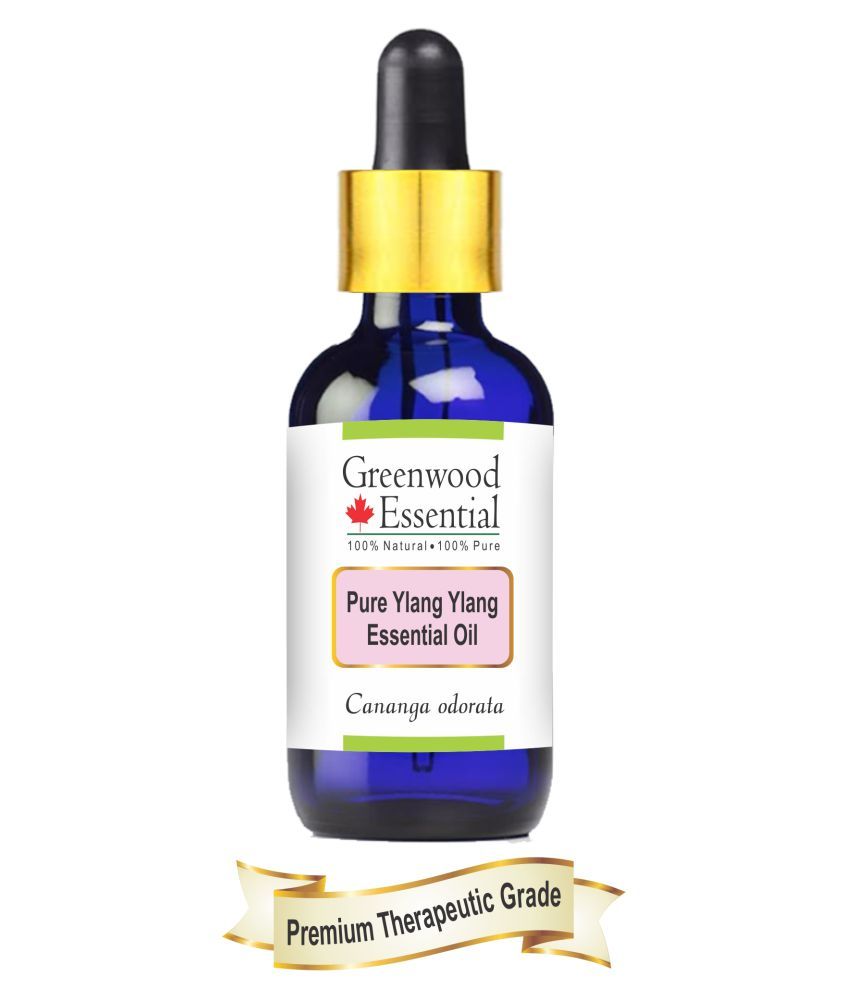Pure Ylang-Ylang Essential Oil (Cananga odorata) The health benefits of Ylang-Ylang Oil can be attributed to its properties as an antidepressant, antiseborrhoeic, antiseptic, aphrodisiac, hypotensive, nervine and sedative substance. This Essential Oil was not widely known about until very recently, but with the thousands of cosmetics products and their adver flooding the television and global media, it soon became a household name and a favorite for aromatherapists. The Essential Oil of Ylang-Ylang is extracted by steam distillation of fresh flowers of the Ylang-Ylang tree, which bears the scientific name Cananga odorata and is commonly found in the rain forests of certain Asian and South Pacific Islands like Indonesia, Philippines, Java, Sumatra, Comoro and Polynesia. The chief components of the Essential Oil of Ylang-Ylang are benzyl acetate, benzyl benzoate linalool, caryophyllene, geranyl acetate, m benzoate, p-cresyl m and other components known as Sesquiterpenes, which all contribute to its aroma and medicinal properties. Along with its widespread use in perfumes and aromatherapy treatments due to its very pleasing and delicate fragrance, it is also used for a variety of medicinal purposes. Health Benefits Let’s investigate how many of the medicinal properties of Ylang-Ylang Oil match up with the mass media adver. Antidepressant: This is one of the oldest known medicinal properties of Ylang-Ylang Oil and it is a part of the essential Oil as well. It fights depression and relaxes both the body and soul, thereby driving away anxiety, sadness, and chronic stress. It also has an uplifting effect on mood and induces feelings of joy and hope. It may be an effective treatment for those undergoing nervous breakdowns and acute depression after a shock or an accident. Antiseborrhoeic: Seborrhoea or Seborrhoeic Eczema is a horrible disease that is caused due to malfunctioning sebaceous glands. This disorder results in irregular sebum production and the consequent infection of the epidermal cells. It looks very unattractive and painful, since the white or pale yellow skin, wh it’s dry or greasy, starts peeling off. This normally happens on the scalp, cheeks, eyebrows and wherever else hair follicles are found. Ylang-Ylang Oil can be beneficial in curing this inflammatory situation and reducing the skin irritation and redness by regularizing sebum production and treating the infection itself. Antiseptic: Any wounds like cuts, sions or burns comes with the chance of the wound becoming septic from various bacterial infections. The risk of complications is even greater when the wound was made by an iron object, as there remains a chance of it becoming infected by tet germs. Essential Oil of Ylang-Ylang can help to avoid both sepsis and tet by inhibiting microbial growth and disinfecting the wounds. This property of Ylang-Ylang Oil protects your wounds from infections from bacteria, virus and fungus. It also helps to speed up the healing process of the wound. Hypotensive: This Oil is a very effective agent for lowering . In recent times, since high is a major health epidemic among both the young and the old, and the s for lowering it having serious adverse side effects on the health, Ylang-Ylang Oil can be an easy and natural solution. It has no adverse side effects on health, if taken in prescribed quantities. Nervine: Ylang-Ylang Oil is a health booster for the nervous system. It strengthens the nervous system and repairs any damage it may have suffered. Furthermore, it also reduces stress on the nerves and protects them from developing a number of nervous disorders. Sedative: This Oil sedates or calms nervous afflictions, stress, anger and anxiety, while inducing a relaxed feeling. Other Benefits: Ylang-ylang Oil can be used to cure infections in internal organs such as the stomach, intestines, colon, and urinary tract. It is also good for people suffering from insomnia, fatigue, frigidity and other stress related conditions. It is extremely effective in maintaining moisture and Oil balance of the skin and keeps the skin looking hydrated, smooth and young. Few Words of Caution: Some cases of sensitivity, nausea and headache have been observed when taken in excessive amounts. Otherwise, when taken in recommended doses, it is non-toxic and is not reported to cause any irritation. Blending: The Essential Oil of Ylang-Ylang makes very good blends with essential Oils derived from bergamot, grapefruits, lavender and sandalwood.

